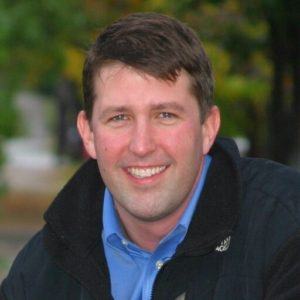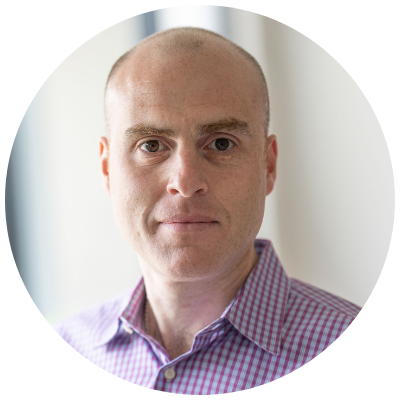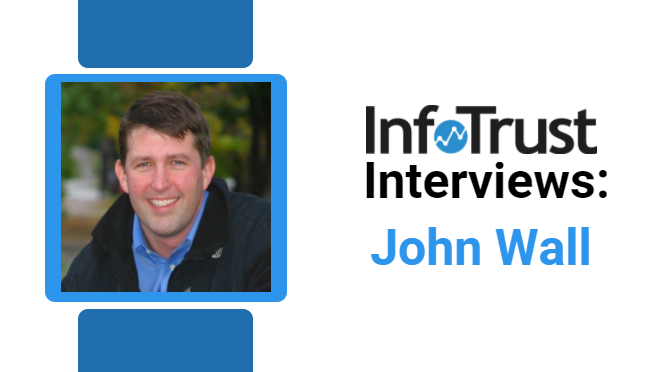
We had the great honor to sit down with John Wall, Producer of M Show Productions and Vice President of Marketing at EventHero, a dynamic, real-time solution for event management. A company whose creations include the popular Marketing Over Coffee podcast and B2B Marketing Confessions book, M Show Productions also consults clients on marketing campaigns and their execution. Our conversation covered marketing habits, the biggest trends in the industry, the truths about marketing, and much more.
About John Wall
ML: First of all, big fan of your show. I love the content that you’re creating. Hopefully, we’ll get the chance to talk a bit about it, but before we get started with all the questions about the project and about your work experience, can you tell me a little bit more about who you are, what you do, and your experience in the digital marketing space?
JW: Of course. I started in digital marketing all the way back in 1997. I was working for a company that did technology events, Data Warehousing World and the first CRM actually that was of any consequence, just as Salesforce was getting off the ground. Since then, I’ve been at a number of start-ups, both venture-backed and privately-held. The most recent one was AccuRev back in 2010. That was acquired by Micro Focus. After that, I’ve began working on a number of other projects including the Marketing Over Coffee podcast. Now, I’m at a company called EventHero that does analytics and data for in-person events, which continues to be a great way to use your marketing budget to generate leads, and that’s been my path to where I am today.
ML: Over the years, can you tell me more about some of the marketing beliefs that you firmly formed? Maybe some of the postulates that you believe in about digital marketing or marketing overall?
JW: Sure, first and foremost is having listened to Simon Sinek and talked with him about his Start With Why arguments. You really have to align yourself with what you’re trying to accomplish and define who you are. People will identify with you and follow you if they believe the same things that you believe in. Anything that’s more transaction-based or is just about something simpler, ends up in a situation where you become replaceable very easily. The whole goal is to become indispensable. You want people to miss you when you’re gone. Keeping a personal touch on everything you do, and not using technology to simply spam or to send non-personal communications, which is something that will just get you in trouble. Everything you want to do, as far as your technology wants, is meant to amplify your statement of why you’re doing what you’re doing, and to try and get more personal connections. That’s at the core of it and then, all the way down to the business level, of course the real challenge is matching the amount of resources you have at your disposal with what you’re trying to do.
I think one thing that I’ve picked up along the way is, in generating traction, it’s very organic. You have to take the time required, regardless of the expense, if you really want it to grow. And then always be testing. You have to always test, explore and try and find those ways to do it, so you can get to some place where you’re financially viable and successful. It’s not enough just to make something great; you do have to sell enough of it to stay alive.
About Marketing Over Coffee
ML: Let’s talk about your podcast,Marketing Over Coffee. Do you have any marketing habits that are worth noting, habits that you feel work exceptionally well for you when doing great marketing?
JW: The podcast has been the real habit for us of putting out content every week and making sure that it’s topical, that it’s not only covering everything happening in the industry and keeping people up to date, but also that it’s educational and provides some higher- level value. It’s about trying to help people figure out which direction to go in or what the big trends are and how they’re going to affect you. Creating audio weekly has been a big part of what’s worked well as far as me being able to build a network of people that have similar interests and have similar goals. That’s really been the best networking I can do. It’s amazing how just being able to communicate with people that have the same problems and challenges is satisfying. Digital marketing can be a very individual pursuit, but you have to find a tribe to run with, to be able to share that knowledge, and that can be very satisfying.
ML: What do you feel served as the inspiration to launch the podcast in the first place?
JW: For our podcast, the original concept is based on radio, and the idea is that within the typical drive-time commute, there are about twenty minutes where you can give somebody the highlights, the most interesting stuff, as well as be entertaining. That’s really what’s driven the show. There are many podcasts that go for an hour and a half, and have tons of guests or have lots and lots of material. That’s never been our goal. Our goal has been to get in quickly, provide some real value, and make it something that is fun for people to listen to. Not only are they taking their vitamins and learning, but they’re also enjoying hearing about it in a unique fashion and hopefully getting a laugh or two along the way. That recipe has worked really well for us.
Earlier, I tried to do a more general show and, about eight years ago, realized that by focusing specifically on digital marketing, and getting a lot more niche as far as who we were talking to, allowed us to find an audience that was our own. By focusing on marketing and making really specific content that’s very valuable and can’t be found anywhere else, it makes for a very powerful way to spend your time.
ML: You’ve interviewed a number of different people on your show. Are there specific topics, people or conversations that really stand out to you, that you listen to on a regular basis?
JW: I mentioned Simon Sinek’s Start With Why and his other book, Leaders Eat Last, but another book that I always find myself going back to is Traction by Gabriel Weinberg, which basically breaks marketing down into nineteen separate channels. The big idea is that as any product is in its early stages, you’re going to find one channel that generates the majority of results for you. Let’s say, for example, you find that it’s Google AdWords. If you have three different campaigns going and you’ve got a third of your money going to Google AdWords, you may do okay and see that this particular channel has promise. When it beats out the other two, at that point, you want to put all the money on Google AdWords.
You want to become the best that you can. You want to have the best copy and you want to do as good a job as you can at identifying keywords, negative keywords, and become a specialist in that. You’ll find it will start to pay off, and the payoff will increase as you get deeper and as you gain expertise. When you’re a small company, you literally do want to put all your eggs in one basket. Then, as time goes on, you can refocus, pick and add new channels. That book is a great resource for outlining. You can sit back every six months and say, “Okay where am I today? Where should we go next?” It gives you ideas as far as channels and even concrete tactical examples of five things
About B2B Marketing Confessions
ML: With books in mind, do you mind if we talk a little bit more about your book, B2B Marketing Confessions?
JW: Absolutely. It’s funny, it has been out for a couple of years now, so I tend not to push it as hard as I could. I do have to say for one that it stands well with Gabriel Weinberg’s Traction in that it’s very similar. It covers a lot of tactics. B2B Marketing Confessions is my voyage, and there are a lot of stories in there of crazy things that happened to me. Anybody who has done marketing has had moments where they’ve felt like they were going to pass out, because something horrendous has happened, and you’ll get that feeling of what it’s really like in the trenches from my book.
ML: On the back of your book, it says, “What’s the truth about marketing?” I want to ask you: what have you found to be the truth about marketing?
JW: Good question. A lot of it even ties back to Stephen Covey’s Seven Habits. Things like sharpening the saw; every week setting aside an hour to go off, do some research and some reading on whatever is going on in the industry. You never know when the things you pick up will allow you to be more creative. That’s really where creativity comes from, the ability to match together two things that have never been paired together before. It may be another industry software tool or even something that an artist or musician is doing that nobody has ever thought about applying to marketing. That’s a big lesson.
Also,leadership is another real top-level concept. It’s not enough to be a manager. You’re not there to tell people what to do and to deliver quarterly results. Ultimately you want to be a leader. Really, the only definition of a leader is that you have followers. People who listen to what you do, they trust what you say and they believe that you have their best interests at heart. By being that kind of leader, that’s the best insurance for your future that you can have. In marketing, or any other career, if you can be a strong leader and garner some followers, you’ll be able to attack whatever comes at you.
ML: How do you sharpen your own saw? What do you do to become better at marketing? Considering that there are so many new technologies and tools that are available at your disposal, what do you recommend that people do, from personal experience, to really become better?
JW: That’s a great question. Becoming a better copywriter is at the core of it. Your copy is never perfect, and it can always be improved upon. I believe that working at your writing and your copy is critical. Try and expand other parts of your skill set across the marketing spectrum. That’s what’s so fantastic about this field is that you have everything from big data and artificial intelligence, things that are very science and detail-oriented and require a very analytical mind, all the way to photography, painting and illustration which are artistic. We cover the complete spectrum.
Do anything you can to become better in any of those fields and give yourself a greater footprint, as far as your ability to market, by learning more about analytics or becoming more artistic. Being able to create better art, art not in the sense of just the stuff that hangs in museums, but art as far as stuff that’s uniquely personal to you. Stuff that only you can make and is part of what you and your organization are. I think those are great ways to sharpen the saw, to give you an advantage and to make you a better person in the long run.
ML: Fantastic. Last question: are there any upcoming events, episodes or works that you’re planning that you would like to promote and share with the audience?
JW: Yes, you’re right on time! Just last week, I was at an event called Sales Machine in New York City, and was able to sit down with both Seth Godin and Simon Sinek. They are always fan favorites on the show and those episodes do very well. I’m really excited to roll those guys out, and Simon especially talked about a lot of the stuff he’s going to have coming out in the next year. It’s a great chance to hear where he’s going next. I’ve got interviews with both those guys coming up.
Resources:
You can learn more about John on his website
Connect with him on Twitter and LinkedIn
To learn more about Marketing Over Coffee, B2B Marketing Confessions, or EventHero


